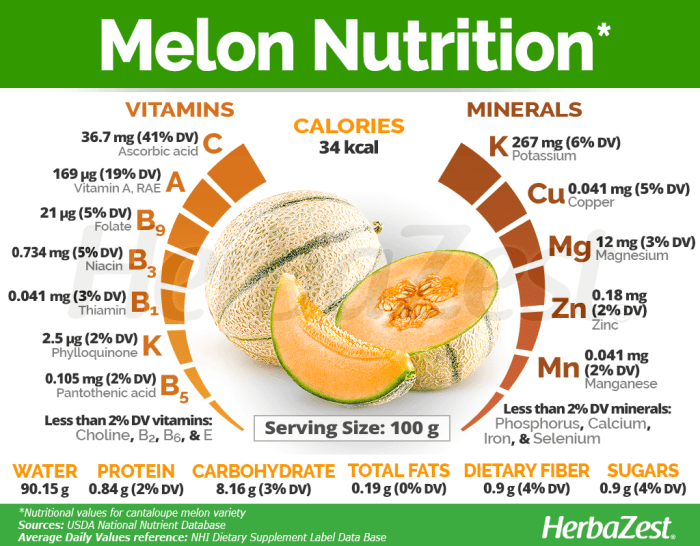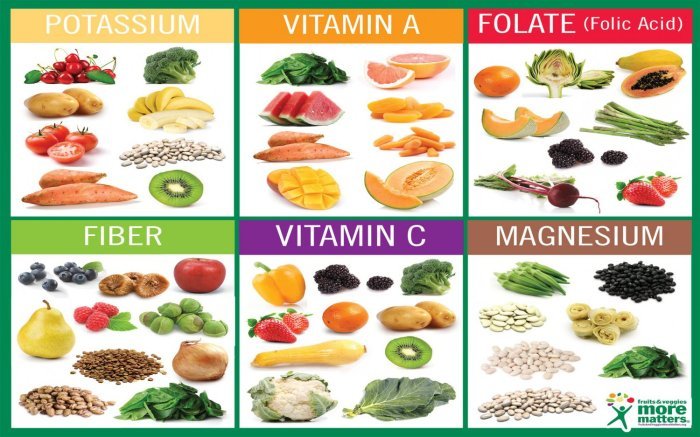Health benefits from cantaloupe extend far beyond its refreshing taste. This vibrant melon, bursting with juicy sweetness, is a nutritional powerhouse packed with vitamins, minerals, and antioxidants. From promoting cardiovascular health and aiding digestion to boosting immunity and enhancing skin health, cantaloupe offers a myriad of benefits for overall well-being.
Cantaloupe’s nutritional profile is impressive, boasting high levels of vitamin C, vitamin A, potassium, and fiber. These essential nutrients contribute to a range of health advantages, making cantaloupe a valuable addition to a balanced diet. Its high water content also makes it an excellent source of hydration, crucial for maintaining bodily functions.
Nutritional Profile of Cantaloupe

Cantaloupe, a sweet and refreshing melon, is not only delicious but also packed with essential nutrients that contribute to overall health. This vibrant fruit boasts a diverse range of vitamins, minerals, and antioxidants, making it a valuable addition to a balanced diet.
Key Nutrients in Cantaloupe
Cantaloupe is an excellent source of several key nutrients, including:
- Vitamin A:A single cup of cantaloupe provides about 120% of the daily recommended intake of vitamin A. This nutrient is crucial for maintaining healthy vision, immune function, and cell growth.
- Vitamin C:Cantaloupe is a good source of vitamin C, offering around 30% of the daily recommended intake per cup. Vitamin C is a powerful antioxidant that supports immune function, collagen production, and wound healing.
- Potassium:A cup of cantaloupe contains approximately 10% of the daily recommended intake of potassium. Potassium is an essential mineral that helps regulate blood pressure, maintain fluid balance, and support muscle function.
- Folate:Cantaloupe provides a significant amount of folate, contributing about 15% of the daily recommended intake per cup. Folate is crucial for cell division and growth, particularly important during pregnancy.
- Fiber:Cantaloupe is a good source of dietary fiber, offering about 1 gram per cup. Fiber promotes digestive health, helps regulate blood sugar levels, and contributes to feelings of fullness.
Comparison with Other Fruits
When comparing the nutritional profile of cantaloupe to other similar fruits, it stands out for its high vitamin A content. While other fruits like oranges and strawberries are excellent sources of vitamin C, cantaloupe surpasses them in terms of vitamin A content.
This makes cantaloupe a particularly valuable choice for individuals seeking to increase their vitamin A intake.
Potential Benefits of Cantaloupe Nutrients, Health benefits from cantaloupe
The diverse array of nutrients found in cantaloupe contributes to various potential health benefits. These include:
- Improved Vision:The high vitamin A content in cantaloupe supports healthy vision and may reduce the risk of age-related macular degeneration.
- Enhanced Immune Function:The combination of vitamin C and other antioxidants in cantaloupe strengthens the immune system, helping the body fight off infections and diseases.
- Reduced Risk of Chronic Diseases:The antioxidants in cantaloupe may help protect against chronic diseases like heart disease, stroke, and certain types of cancer.
- Improved Digestion:The fiber content in cantaloupe promotes regular bowel movements and contributes to a healthy digestive system.
- Blood Pressure Regulation:The potassium in cantaloupe helps regulate blood pressure, which is essential for cardiovascular health.
Antioxidant Benefits of Cantaloupe

Cantaloupe is a rich source of antioxidants, which are compounds that protect your cells from damage caused by free radicals. Free radicals are unstable molecules that can damage cells and contribute to the development of chronic diseases.
Antioxidant Compounds in Cantaloupe
Cantaloupe contains a variety of antioxidants, including:
- Vitamin C: A powerful antioxidant that helps protect cells from damage caused by free radicals. It also plays a role in collagen production, which is important for skin health.
- Vitamin A: Found in cantaloupe as beta-carotene, vitamin A is converted into retinol in the body. Retinol is crucial for vision, immune function, and cell growth.
- Beta-carotene: A precursor to vitamin A, beta-carotene is a potent antioxidant that helps protect against oxidative stress and cell damage. It’s also linked to a reduced risk of certain types of cancer.
- Lycopene: A powerful antioxidant that gives cantaloupe its vibrant orange color. It’s known for its potential to protect against prostate cancer and heart disease.
- Superoxide dismutase (SOD): An enzyme that acts as an antioxidant and helps protect cells from damage caused by free radicals.
Protection Against Oxidative Stress and Cell Damage
Antioxidants in cantaloupe work by neutralizing free radicals, preventing them from damaging cells.
“Antioxidants are compounds that can neutralize free radicals, preventing them from causing damage to cells.”
For example, vitamin C can donate an electron to a free radical, stabilizing it and preventing it from damaging a cell. Similarly, beta-carotene can absorb harmful energy from free radicals, preventing them from causing damage.
Potential Role in Preventing Chronic Diseases
The antioxidants in cantaloupe may help reduce the risk of developing chronic diseases such as heart disease, cancer, and age-related macular degeneration.
- Heart Disease: Antioxidants like vitamin C and lycopene may help lower blood pressure and improve blood flow, reducing the risk of heart disease.
- Cancer: Some studies suggest that antioxidants like beta-carotene and lycopene may help protect against certain types of cancer, including prostate cancer and lung cancer.
- Age-Related Macular Degeneration: Antioxidants like vitamin C and beta-carotene may help protect against age-related macular degeneration, a leading cause of vision loss in older adults.
Cantaloupe and Cardiovascular Health

Cantaloupe, a refreshing and flavorful fruit, offers a range of health benefits, including a positive impact on cardiovascular health. Its rich nutrient profile contributes to blood pressure regulation, cholesterol management, and overall heart health.
Cantaloupe and Blood Pressure Regulation
Cantaloupe contains potassium, a mineral essential for maintaining healthy blood pressure. Potassium helps counterbalance the effects of sodium, which can contribute to high blood pressure. By promoting the removal of excess sodium from the body, potassium helps regulate blood pressure levels.
Cantaloupe and Cholesterol Levels
Cantaloupe’s fiber content plays a role in regulating cholesterol levels. Dietary fiber, particularly soluble fiber, can bind to cholesterol in the digestive tract, preventing its absorption into the bloodstream. By reducing cholesterol absorption, cantaloupe can contribute to lowering LDL (“bad”) cholesterol levels.
Cantaloupe and Heart Disease Risk
The combination of potassium, fiber, and antioxidants in cantaloupe may contribute to reducing the risk of heart disease.
- Potassium helps regulate blood pressure, a key factor in heart health.
- Fiber contributes to lowering cholesterol levels, reducing the risk of atherosclerosis, a condition that can lead to heart disease.
- Antioxidants, such as vitamin C and beta-carotene, protect against oxidative stress, which can damage blood vessels and contribute to heart disease.
Cantaloupe and Digestive Health

Cantaloupe is not only a refreshing summer treat but also a valuable addition to a healthy diet, particularly when it comes to digestive health. Its fiber content and potential to support a healthy gut microbiome make it a beneficial fruit for maintaining a balanced digestive system.
Fiber’s Role in Digestion
Dietary fiber plays a crucial role in maintaining a healthy digestive system. It adds bulk to stool, promoting regular bowel movements and preventing constipation. Cantaloupe is a good source of both soluble and insoluble fiber, contributing to its digestive benefits.
Soluble fiber dissolves in water, forming a gel-like substance that helps regulate blood sugar levels and cholesterol. Insoluble fiber, on the other hand, remains undigested, adding bulk to stool and facilitating smooth passage through the digestive tract.
Cantaloupe and Gut Microbiome
The gut microbiome, a complex ecosystem of trillions of bacteria residing in the intestines, plays a vital role in digestion, immunity, and overall health. A balanced gut microbiome is essential for optimal digestive function, and cantaloupe’s prebiotic properties may contribute to its maintenance.
Prebiotics are non-digestible fibers that serve as food for beneficial bacteria in the gut, promoting their growth and activity. Cantaloupe contains prebiotic fibers, such as pectin, which can help nourish the beneficial bacteria in the gut, contributing to a healthier microbiome.
Cantaloupe’s Potential in Preventing Digestive Issues
Cantaloupe’s high water content, coupled with its fiber content, can help prevent digestive issues such as constipation and diarrhea. The fiber adds bulk to stool, promoting regular bowel movements and preventing constipation. Additionally, the water content in cantaloupe helps soften stool, making it easier to pass.
Cantaloupe, a sweet and refreshing fruit, is not only delicious but also packed with health benefits. It’s a great source of vitamins, minerals, and antioxidants, helping to boost your immune system and improve your overall well-being. And while enjoying the health benefits of cantaloupe, remember to appreciate all the beauty in the world around you, from the vibrant colors of nature to the smiles of loved ones.
After all, a healthy body and a happy mind go hand in hand. So, next time you reach for a slice of cantaloupe, savor its sweet taste and the goodness it brings to your life.
In cases of diarrhea, the soluble fiber in cantaloupe can help absorb excess water in the digestive tract, promoting firmer stools.
Cantaloupe and Skin Health: Health Benefits From Cantaloupe

Cantaloupe is not only a delicious and refreshing fruit but also a treasure trove of nutrients that can benefit your skin. Its vibrant orange flesh is packed with vitamins and minerals that contribute to a healthy complexion, helping you achieve a radiant and youthful glow.
Antioxidant Protection
Antioxidants play a crucial role in protecting your skin from damage caused by free radicals, which are unstable molecules that can contribute to premature aging and wrinkles. Cantaloupe is rich in antioxidants like vitamin C, beta-carotene, and lycopene. These antioxidants work together to combat free radical damage, helping to maintain the skin’s integrity and protect it from environmental stressors.
Vitamin C is a powerful antioxidant that helps to boost collagen production, a protein essential for maintaining skin elasticity and firmness.
Beta-carotene is a precursor to vitamin A, which is vital for skin cell growth and repair. It also helps protect the skin from sun damage.
Lycopene, a potent antioxidant, is responsible for cantaloupe’s vibrant orange color. It has been shown to protect the skin from UV radiation, reducing the risk of sunburn and skin cancer.
Hydration and Elasticity
Cantaloupe is an excellent source of water, which is essential for maintaining skin hydration. Dehydrated skin can become dry, flaky, and prone to wrinkles. The high water content of cantaloupe helps to keep your skin plump and supple, promoting a youthful appearance.
- Cantaloupe also contains potassium, a mineral that helps to regulate fluid balance in the body. This is crucial for maintaining skin hydration and preventing water retention.
- Additionally, the vitamin A in cantaloupe supports the production of sebum, a natural oil that helps to keep the skin moisturized.
Cantaloupe and Hydration

Cantaloupe is a refreshing and delicious fruit that is an excellent source of hydration. Its high water content makes it a perfect choice for staying hydrated, especially during hot weather or after strenuous exercise.
Water Content and Hydration
Cantaloupe is composed of about 90% water, making it a highly hydrating fruit. This high water content is crucial for maintaining proper hydration levels in the body. Staying hydrated is essential for various bodily functions, including regulating body temperature, transporting nutrients, and flushing out waste products.
Electrolyte Balance
Cantaloupe is a good source of electrolytes, including potassium, magnesium, and sodium. Electrolytes are minerals that carry an electrical charge and play a vital role in maintaining fluid balance within the body. When we sweat, we lose electrolytes, which can lead to dehydration.
Consuming cantaloupe can help replenish these lost electrolytes and prevent imbalances.
Preventing Dehydration
Cantaloupe’s high water content and electrolyte content make it an effective tool for preventing dehydration. Eating cantaloupe can help individuals stay hydrated, especially those who are prone to dehydration, such as athletes, people who work outdoors, or individuals with certain medical conditions.
Cantaloupe and Immunity
Cantaloupe is a delicious and refreshing fruit that is packed with nutrients that can help boost your immune system. By consuming cantaloupe regularly, you can strengthen your body’s natural defenses against infections and illnesses.
Cantaloupe is a delicious and refreshing fruit that’s packed with vitamins and minerals. It’s a great source of vitamin A, which is important for healthy vision, and vitamin C, which helps boost the immune system. For families looking to incorporate healthy habits into their daily routine, consider visiting california family fitness for fun and engaging activities.
You can then reward yourselves with a slice of cantaloupe, knowing you’re getting a nutritious treat.
Vitamin C’s Role in Immunity
Vitamin C is a powerful antioxidant that plays a crucial role in supporting a healthy immune system. It helps to stimulate the production of white blood cells, which are essential for fighting off infections. These cells act as the body’s first line of defense against pathogens, such as bacteria, viruses, and fungi.
Other Nutrients Supporting Immunity
In addition to vitamin C, cantaloupe contains other nutrients that contribute to a strong immune system. These include:
- Vitamin A:This vitamin is essential for maintaining the integrity of mucous membranes, which act as barriers against infections. It also supports the production of antibodies, which help to neutralize pathogens.
- Potassium:This mineral is important for regulating fluid balance in the body, which is crucial for immune function. It also helps to maintain blood pressure, which can be affected by infections.
- Magnesium:This mineral plays a role in the production of white blood cells and helps to regulate the immune response. It also supports the production of cytokines, which are signaling molecules that help to coordinate the immune system.
Examples of Cantaloupe’s Immune-Boosting Benefits
Cantaloupe’s rich nutrient profile can help to fight infections in several ways. For example, its high vitamin C content can help to shorten the duration of colds and flu. The fruit’s antioxidants can also help to protect against damage caused by free radicals, which can weaken the immune system.
Additionally, the potassium in cantaloupe can help to reduce inflammation, which can contribute to a weakened immune system.
Cantaloupe in a Balanced Diet

Cantaloupe is a versatile fruit that can be easily incorporated into a healthy and balanced diet. Its refreshing taste and nutritional value make it a great addition to various meals and snacks.
Sample Meal Plan Incorporating Cantaloupe
Here’s a sample meal plan showcasing how to incorporate cantaloupe into a balanced diet: Breakfast:Cantaloupe and Yogurt Parfait: Layers of Greek yogurt, granola, and diced cantaloupe. Lunch:Cantaloupe Salad: A refreshing salad with mixed greens, feta cheese, chopped cantaloupe, and a light vinaigrette.
Cantaloupe is a delicious and refreshing fruit packed with vitamins and minerals that can benefit your health in numerous ways. From boosting your immune system to aiding in digestion, cantaloupe offers a variety of advantages. If you’re looking for a healthy and tasty treat, consider adding cantaloupe to your diet.
While enjoying the benefits of cantaloupe, you might also want to check out the lyrics to the song “Health the World,” health the world lyrics , which promotes a healthy lifestyle and a positive outlook on life. Just like cantaloupe, the song reminds us to take care of ourselves and our world, encouraging a healthy and fulfilling journey.
Dinner:Grilled Salmon with Cantaloupe Salsa: Grilled salmon topped with a salsa made from diced cantaloupe, red onion, cilantro, and lime juice. Snack:Cantaloupe Smoothie: Blend cantaloupe with spinach, banana, and almond milk for a healthy and refreshing snack.
Ways to Enjoy Cantaloupe in Various Recipes
Cantaloupe can be enjoyed in various ways, adding a burst of flavor and nutrition to your meals. Here’s a table showcasing some popular ways to incorporate cantaloupe into different recipes:| Recipe Type | Example ||—|—|| Salads | Cantaloupe and feta cheese salad with a balsamic vinaigrette || Smoothies | Cantaloupe, spinach, banana, and almond milk smoothie || Desserts | Cantaloupe sorbet, cantaloupe and honey yogurt parfait || Main Courses | Grilled chicken with cantaloupe salsa, cantaloupe and shrimp skewers || Snacks | Cantaloupe cubes, cantaloupe and prosciutto skewers |
Tips for Incorporating Cantaloupe into a Healthy and Balanced Diet
Enjoy it fresh
Cantaloupe is best enjoyed fresh, as it retains its nutrients and flavor.
Add it to salads
Cantaloupe adds sweetness and a refreshing touch to salads.
Blend it into smoothies
Cantaloupe can be blended into smoothies for a healthy and delicious treat.
Use it in desserts
Cantaloupe can be used in various desserts, such as sorbets, parfaits, and fruit salads.
Pair it with savory dishes
Cantaloupe can be paired with savory dishes, such as grilled chicken or fish.
Consider its seasonality
Cantaloupe is a seasonal fruit, so enjoy it during its peak season for the best flavor and nutritional value.
End of Discussion

Incorporating cantaloupe into your diet can be a delicious and rewarding way to enhance your health. Its sweet flavor and versatility make it easy to enjoy in various forms, from salads and smoothies to desserts and snacks. So, next time you’re looking for a healthy and refreshing treat, reach for a slice of cantaloupe and savor its numerous health benefits.
Common Queries
Is cantaloupe good for weight loss?
Cantaloupe is low in calories and high in fiber, which can help promote feelings of fullness and reduce overall calorie intake, making it a good choice for weight management.
Can pregnant women eat cantaloupe?
Cantaloupe is generally safe for pregnant women to consume. It’s a good source of folate, which is essential for fetal development.
Are there any side effects to eating cantaloupe?
While cantaloupe is generally safe, some people may experience mild side effects like bloating or gas due to its high fiber content. If you have any concerns, consult with your doctor.
How long does cantaloupe last?
Ripe cantaloupe can last for about 3-5 days in the refrigerator. You can tell if it’s gone bad by its smell, texture, and appearance.